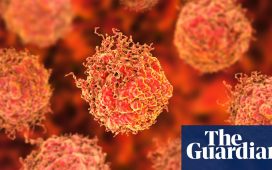A blood test that identifies signs of cancer up to a year before tumours have even formed has been developed by scientists. Trial results have proved 100 percent accurate, even detecting cancers in the “control group” of patients who were believed to be cancer-free.
Researchers say that if the 1,000-strong trial can be successfully replicated on a larger scale it would represent the “holy grail” of cancer diagnosis, offering easy access to early, life-saving treatment.
The blood biopsy technique, which shows changes in how stem cells are behaving, could be the biggest cancer breakthrough in decades.
The first trial has been published in Stem Cell Reviews and Reports, and this month the science behind it was outlined in the journal Stem Cells.
It found a blood sample passed through “next generation” gene sequencing machinery not only picked up early signals of the disease before cancer cells formed, it also identified cancer types and the stage of cancer once it had developed.
The trial of 1,000 patients comprised half who had a prior cancer diagnosis or went on to have cancer shortly after follow-up and the other half – the control group – who did not.
Those who had already been diagnosed had undergone the raft of tests normally used. This includes cell or tissue analysis from biopsies, CT scans, mammograms, X-rays and various blood tests. Often cancers are well established by the time they are diagnosed and so are harder to treat.
Yet the blood test proved 100 percent accurate in identifying cancer patients. It also identified three in the control group thought to be cancer-free, who then developed cancer in the following 12 months.
The test, known as HrC, has been co-developed by Mumbai-based biotech firm Epigeneres and Singapore-based diagnostic company Tzar Labs.
It is designed to pick up specific markers which show changes in the behaviour of stem cells that are a precursor to cancer mutations.
Now experts at universities across the UK want to replicate the findings and plans are being made for trials across leading universities and hospitals.
Imperial College, Manchester University and Cardiff University are drawing up “proof of concept” trials, while scientists at St Bartholomew’s Hospital, London, will hold a larger study.
Dr Sherif Raouf, a leading consultant gastrointestinal cancer specialist who will lead a trial at St Barts, said: “Picking up cancer at the earliest stage is the holy grail of cancer medicine.
“Normally this is not an easy process. Many patients currently undergo scans, biopsies and clinic appointments. To have one blood test to detect the presence of cancer at the earliest stage – or even before it develops – could save many lives. This could be a game-changer.”
Ashish Tripathi, the CEO of Tzar Labs, said: “This screening method has been shown to detect all types of cancer early, from a simple blood test – even before tumours have formed. It is the first prognostic or predictive test for cancer in the world.”











